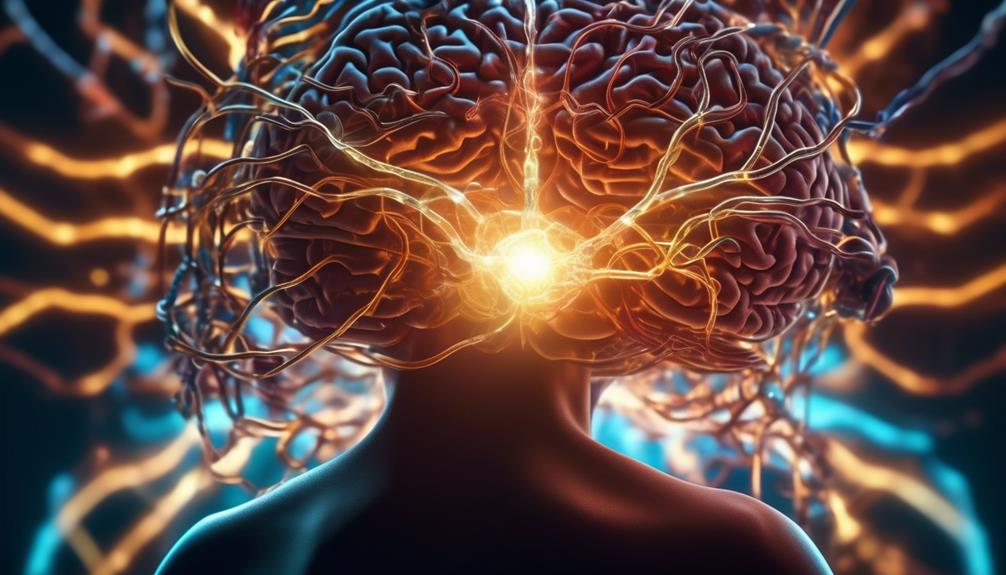Are you tired of constantly feeling foggy and mentally drained? Imagine a life where your mind is sharp, focused, and clear, allowing you to tackle any challenge that comes your way.
Well, achieving mental clarity may be closer than you think, thanks to the ketogenic lifestyle. By following a low-carb, high-fat diet, you can optimize your brain function and unlock a whole new level of mental clarity.
But how does it work? What are the benefits? And most importantly, how can you get started? In this discussion, we will explore the science behind ketosis, the role of ketones in fueling the brain, the benefits of mental clarity on the ketogenic diet, and practical tips to transition to this lifestyle.
Get ready to take control of your mental well-being like never before.
The Science Behind Ketosis

The science behind ketosis reveals how adopting a ketogenic lifestyle can promote mental clarity and enhance overall well-being. Ketosis is a metabolic state in which the body primarily uses ketones, derived from fat, as its main source of energy instead of glucose.
Research on ketosis has shown several benefits, especially concerning metabolism. When you enter a state of ketosis, your body becomes efficient at burning fat for energy. This metabolic shift can have a profound impact on your overall metabolism. As your body switches from using glucose to ketones, it becomes better at utilizing stored fat, leading to weight loss. In addition, ketosis can improve insulin sensitivity, which is crucial for maintaining stable blood sugar levels and preventing diabetes.
Furthermore, ketosis has been linked to enhanced mental clarity and cognitive function. The brain is a highly energy-demanding organ, and ketones provide a more stable and efficient fuel source compared to glucose. Research suggests that a ketogenic lifestyle may improve focus, concentration, and memory. Some studies have even shown the potential benefits of ketosis for conditions such as Alzheimer's disease and epilepsy.
How Ketones Fuel the Brain
Ketones, the byproducts of fat metabolism, play a crucial role in fueling the brain and providing a stable source of energy. When you follow a ketogenic diet, your body switches from using glucose as its primary fuel source to using ketones. This shift has significant implications for brain function and cognitive performance.
Research has shown that ketones can enhance brain function in several ways. Firstly, ketones provide a more efficient and sustainable source of energy for the brain compared to glucose. Unlike glucose, which fluctuates in availability, ketones offer a stable and consistent source of fuel. This stability helps to improve cognitive function, focus, and mental clarity.
Additionally, ketones have been found to have neuroprotective effects. They can help reduce inflammation, oxidative stress, and enhance the production of brain-derived neurotrophic factor (BDNF), a protein that promotes the growth and survival of brain cells. These effects can potentially improve memory, learning, and overall cognitive performance.
Moreover, ketones have been shown to increase the production of gamma-aminobutyric acid (GABA), a neurotransmitter that helps regulate brain activity and promotes relaxation. This can lead to reduced anxiety and improved mood.
Understanding the Ketogenic Diet

Now it's time to understand the ketogenic diet and its benefits for mental clarity.
By achieving a state of ketosis, your body begins to burn fat for fuel instead of carbohydrates, resulting in increased energy levels and improved brain function.
The key to success on this diet lies in making the right food choices, focusing on high-fat and low-carb options that promote ketosis.
As a result, you can experience enhanced mental clarity and cognitive performance.
Benefits of Ketosis
To fully understand the benefits of ketosis, it's important to delve into the science behind the ketogenic diet and its impact on mental clarity.
When your body is in ketosis, it switches from using glucose as its primary fuel source to using ketones, which are produced from stored fat. This shift in energy metabolism has been shown to have positive effects on mental focus and mood.
Studies have found that ketosis can enhance cognitive function and improve overall mental performance. By providing a steady and efficient source of fuel to the brain, the ketogenic diet helps to optimize brain function and support mental clarity.
Additionally, the stabilization of blood sugar levels that occurs during ketosis can contribute to a more balanced mood. So, by following a ketogenic lifestyle, you can experience improved mental focus and a more positive mood.
Ketogenic Food Choices
When following the ketogenic lifestyle for mental clarity, understanding the ketogenic diet and making appropriate food choices is crucial. Here are some essential keto-friendly snacks to keep you on track:
- Nuts and seeds: Almonds, walnuts, and chia seeds are packed with healthy fats and low in carbs.
- Avocado: This creamy fruit is an excellent source of healthy fats and fiber.
- Cheese and cured meats: Opt for hard cheeses like cheddar or gouda, and choose cured meats like salami or prosciutto.
- Vegetables: Stick to low-carb options like broccoli, cauliflower, and spinach.
Maintaining ketosis while dining out can be challenging, but it's not impossible. Here are some tips:
- Choose grilled or roasted protein options like steak or chicken.
- Opt for non-starchy vegetables as your side dish.
- Ask for sauces and dressings on the side to control the amount you consume.
Mental Clarity Effects
Understanding the ketogenic diet can provide valuable insights into the mental clarity effects it offers. One of the key benefits of mindfulness is improving focus and concentration, and the ketogenic lifestyle can greatly contribute to this.
When you follow a ketogenic diet, your body enters a state of ketosis, where it primarily uses ketones for fuel instead of glucose. This shift in energy source has been shown to enhance cognitive function and mental clarity. By reducing blood sugar fluctuations and providing a steady supply of energy to the brain, the ketogenic diet supports improved focus and concentration.
Additionally, the diet encourages the consumption of healthy fats, which are essential for brain health and function. So, by adopting a ketogenic lifestyle, you can experience improved mental clarity and enhance your ability to stay focused and attentive.
Benefits of Mental Clarity on the Ketogenic Diet

The ketogenic diet consistently promotes mental clarity, allowing for improved focus and cognitive function. When you adopt this low-carb, high-fat diet, you may experience several benefits that enhance your mental capabilities.
- Enhanced mental focus: By reducing your intake of carbohydrates and increasing your consumption of healthy fats, your brain is fueled by ketones instead of glucose. This steady supply of ketones provides a more stable and efficient source of energy for your brain, resulting in improved mental focus and concentration.
- Increased cognitive function: The ketogenic diet has been shown to enhance cognitive function by increasing the production of brain-derived neurotrophic factor (BDNF), a protein that promotes the growth and maintenance of brain cells. This can lead to improved memory, learning, and overall cognitive performance.
- Reduced brain fog: Many people experience a state of mental clarity on the ketogenic diet, which can help alleviate brain fog. Brain fog is characterized by a lack of mental clarity, difficulty concentrating, and feeling mentally sluggish. By providing a stable source of energy to your brain, the ketogenic diet can help clear away this mental fog and improve cognitive function.
Getting Started: Transitioning to a Ketogenic Lifestyle
To begin your journey into the ketogenic lifestyle, it's important to make a smooth and effective shift towards this low-carb, high-fat diet. The key to a successful transition lies in proper meal preparation and maintaining ketosis.
First and foremost, you need to understand the macronutrient composition of the ketogenic diet. It involves consuming approximately 75% of your daily calories from healthy fats, 20% from protein, and only 5% from carbohydrates. This drastic reduction in carbs forces your body to enter a state of ketosis, where it burns fat for fuel instead of carbohydrates.
To get started, clean out your pantry and stock up on keto-friendly foods. Fill your fridge with avocados, nuts, seeds, eggs, fatty fish, and grass-fed meats. Incorporate plenty of low-carb vegetables like spinach, broccoli, and cauliflower into your meals.
Meal preparation plays a crucial role in maintaining ketosis. Plan your meals ahead of time and cook in bulk to ensure you always have keto-friendly options on hand. This will help you avoid temptation and make sticking to the diet easier.
Essential Foods for a Ketogenic Diet

Incorporating nutrient-dense, low-carb foods is essential for maintaining a ketogenic diet. To help you stay on track and achieve your mental clarity goals, here are some essential foods to include in your ketogenic meal plan:
- Fresh vegetables: Load up on non-starchy vegetables like leafy greens, broccoli, cauliflower, and zucchini. These provide essential vitamins, minerals, and fiber while keeping your carb intake low.
- Healthy fats: Include ample amounts of healthy fats in your diet, such as avocados, olive oil, coconut oil, and nuts. These provide sustained energy and help you feel satisfied after meals.
- High-quality protein: Opt for sources like grass-fed beef, free-range poultry, and wild-caught fish. Protein is important for muscle repair, satiety, and overall health.
When it comes to grocery shopping for your ketogenic lifestyle, keep these meal ideas in mind:
- Stock up on eggs, a versatile and nutrient-dense option for breakfast or as a base for other meals.
- Choose fatty cuts of meat like bacon, salmon, and chicken thighs to ensure you're getting enough fat in your diet.
- Don't forget to grab low-carb vegetables and leafy greens to build your meals around.
Meal Planning for Mental Clarity
When it comes to maintaining mental clarity on a ketogenic diet, meal planning is key. By carefully selecting and preparing your meals in advance, you can ensure that you have the right balance of nutrients to support optimal brain function.
This includes incorporating foods rich in healthy fats, lean proteins, and low-carbohydrate vegetables. Additionally, planning your meals ahead of time can help you stay on track with your ketogenic lifestyle and avoid making impulsive food choices that could negatively impact your mental clarity.
Benefits of Ketogenic Meal Planning
Embrace the mental clarity that comes with a ketogenic meal plan. By incorporating ketogenic meal planning into your routine, you can experience a range of benefits that contribute to improved mental clarity. Consider the following advantages:
- Enhanced focus: A ketogenic diet helps stabilize blood sugar levels, providing a steady supply of energy to your brain, resulting in increased focus and concentration.
- Reduced brain fog: Ketogenic meal planning eliminates processed foods, reducing inflammation in the body and brain, leading to clearer thinking and improved cognitive function.
- Improved mood: The ketogenic lifestyle promotes the production of ketones, which have been shown to have a positive impact on brain health, potentially reducing symptoms of anxiety and depression.
Tips for Successful Meal Planning
To optimize your meal planning for mental clarity, consider implementing these practical tips.
First, incorporate meal prepping into your routine. Spend a few hours each week preparing and portioning your meals in advance. This will save you time and ensure that you have healthy, keto-friendly options readily available.
Additionally, make a detailed grocery list before heading to the store. Stick to the list and avoid impulse purchases that may derail your ketogenic goals. When grocery shopping, focus on whole, unprocessed foods such as meat, fish, eggs, vegetables, and healthy fats. Avoid foods high in refined carbs and sugars.
Finally, experiment with different recipes and flavors to keep your meals interesting and enjoyable.
Maintaining Ketosis: Common Pitfalls to Avoid

Avoiding common pitfalls is crucial in maintaining ketosis and reaping the benefits of the ketogenic lifestyle. To help you stay on track, here are some troubleshooting tips to navigate through the obstacles that may arise:
- Mindless snacking: Snacking on high-carb foods can quickly kick you out of ketosis. Be mindful of your snack choices and opt for low-carb options like nuts, seeds, or cheese.
- Hidden carbs: Many processed foods contain hidden carbs that can unknowingly sabotage your ketosis. Always read labels carefully and be aware of ingredients like sugar, grains, and starches.
- Insufficient fat intake: Consuming enough healthy fats is vital for maintaining ketosis. Make sure to incorporate sources like avocados, olive oil, and coconut oil into your meals to meet your fat requirements.
Exercise and Mental Clarity: Finding the Balance
After successfully navigating the common pitfalls of maintaining ketosis, it's important to explore the impact of exercise on mental clarity in order to strike a balance between physical activity and cognitive function.
Incorporating exercise into your ketogenic lifestyle can have numerous benefits for your mental well-being. Engaging in regular physical activity has been shown to enhance brain function and improve cognitive performance. Exercise increases blood flow to the brain, delivering oxygen and nutrients that support optimal brain health. It also stimulates the release of endorphins, neurotransmitters that promote feelings of happiness and reduce stress and anxiety.
When following a ketogenic diet, finding the motivation to exercise may be challenging due to the initial decrease in energy levels during the adaptation phase. However, once your body becomes fat-adapted, you'll likely experience increased energy and endurance, making exercise more enjoyable and rewarding.
To find the motivation to exercise, consider incorporating activities that you genuinely enjoy. Whether it's going for a walk in nature, practicing yoga, lifting weights, or participating in a team sport, finding an exercise routine that brings you joy will help you stay consistent.
Intermittent Fasting and Ketosis

Intermittent fasting and ketosis can have significant benefits for mental clarity. By restricting your eating window and allowing your body to enter a state of ketosis, you can enhance cognitive function and focus.
Research suggests that fasting and ketosis can improve brain health, increase energy levels, and reduce inflammation, leading to improved mental clarity and overall well-being.
Benefits of Fasting
To experience the numerous benefits of fasting, incorporating intermittent fasting and entering a state of ketosis can provide you with mental clarity and improved overall well-being.
When you engage in intermittent fasting, your body switches from using glucose as its primary fuel source to using stored fat. This shift in metabolism leads to the production of ketones, which have been shown to have neuroprotective effects on the brain.
Fasting has been linked to increased brain-derived neurotrophic factor (BDNF), a protein that supports the growth and survival of brain cells. Moreover, fasting can enhance autophagy, a cellular process that removes damaged cells and toxins from the brain.
Ketosis and Mental Clarity
When you embrace a ketogenic lifestyle through intermittent fasting, you can unlock mental clarity and improve your overall well-being. One key aspect of this is the state of ketosis, which occurs when your body uses ketones as an alternative fuel source instead of glucose.
Ketones are produced when your body breaks down fat for energy, and they've been found to have numerous benefits for brain health. Studies have shown that being in a state of ketosis can improve cognitive function and enhance mental clarity.
The ketogenic diet, which promotes ketosis, has been associated with improved memory, focus, and attention span. By adopting a ketogenic lifestyle and entering ketosis, you can harness the power of your brain and experience increased mental clarity and overall cognitive function.
Supplements for Optimal Mental Performance
For optimal mental performance, incorporating certain supplements into your ketogenic lifestyle can be beneficial. Along with maintaining a low-carb, high-fat diet, these supplements can provide additional support in improving focus and cognitive function.
Consider adding the following supplement recommendations to your routine:
- Omega-3 Fatty Acids: These essential fats are known for their ability to support brain health. Found in fish oil or algae-based supplements, omega-3 fatty acids have been shown to enhance cognitive performance and reduce symptoms of mental decline.
- MCT Oil: Medium-chain triglycerides (MCTs) are a type of fat that can be easily converted into ketones, which are the primary fuel source for your brain on a ketogenic diet. Adding MCT oil to your daily routine can provide a quick and efficient energy boost for enhanced mental clarity.
- B vitamins: B vitamins play a crucial role in brain function and can help improve focus and memory. Consider taking a B complex supplement to ensure you're getting an adequate amount of these essential nutrients.
Incorporating these supplements into your ketogenic lifestyle can provide the additional support your brain needs for optimal mental performance. However, it's important to consult with a healthcare professional before starting any new supplements to ensure they're appropriate for you.
Overcoming Challenges on the Ketogenic Journey

Navigating the ketogenic journey can present various challenges, but with the right strategies and mindset, you can overcome them and achieve your health and wellness goals. Overcoming obstacles and maintaining motivation are key to staying on track with the ketogenic lifestyle.
One of the challenges you may encounter on the ketogenic journey is the initial adjustment period, commonly known as the 'keto flu.' During this time, you may experience symptoms such as fatigue, irritability, and brain fog. To overcome this, it's important to stay hydrated, replenish electrolytes, and give your body time to adapt to using ketones for fuel.
Another challenge you may face is social pressure and temptation to stray from your ketogenic diet. This can happen when attending social gatherings or dining out with friends and family. To overcome this, plan ahead by researching keto-friendly options at restaurants or offering to bring a dish to share that aligns with your dietary needs.
Maintaining motivation can also be a challenge on the ketogenic journey. To stay motivated, set achievable goals, track your progress, and surround yourself with a supportive community. Connecting with others who are also following the ketogenic lifestyle can provide encouragement, accountability, and helpful tips and tricks.
Tracking Progress: Tools for Success
To successfully track your progress on the ketogenic journey, utilize effective tools that will help you stay accountable and motivated. Here are three essential tools for tracking your progress and measuring success:
- Food diary: Keeping a detailed record of your daily food intake is crucial for tracking your progress on the ketogenic diet. By documenting every meal and snack, you can accurately calculate your macronutrient intake and ensure you're staying within the recommended range for a successful ketogenic lifestyle. A food diary also allows you to identify any patterns or triggers that may affect your progress.
- Body measurements: In addition to tracking your weight, taking regular body measurements can provide a more comprehensive view of your progress. Measure your waist, hips, arms, and thighs regularly to monitor changes in body composition. As you lose fat and gain muscle, these measurements can serve as tangible evidence of your success.
- Blood ketone meter: Measuring your blood ketone levels is a direct way to assess your state of ketosis. A blood ketone meter provides accurate readings of your ketone levels, helping you stay on track and make necessary adjustments to your diet and lifestyle. Aim for a range of 0.5-3.0 mmol/L for optimal ketosis.
Embracing the Ketogenic Lifestyle for Long-Term Mental Clarity

If you're seeking long-term mental clarity, embracing a ketogenic lifestyle can provide cognitive benefits and help sustain mental sharpness.
Research suggests that the low-carb, high-fat ketogenic diet may improve brain function and boost cognitive performance.
Cognitive Benefits of Keto
Embrace the ketogenic lifestyle for long-term mental clarity and experience the cognitive benefits it offers. The ketogenic diet has been found to enhance cognitive performance and improve brain function.
Here are three ways the ketogenic lifestyle can benefit your cognitive abilities:
- Increased focus and concentration: By reducing carbohydrate intake and relying on ketones for energy, the brain becomes more efficient at utilizing fuel. This can lead to improved focus and concentration throughout the day.
- Enhanced memory and learning: Ketones have been shown to provide a more stable and consistent source of energy for the brain, which can support memory formation and learning processes.
- Reduced brain inflammation: The ketogenic diet has anti-inflammatory effects, which can help protect the brain from inflammation-induced cognitive decline.
Sustaining Mental Sharpness
Sustaining mental sharpness and achieving long-term mental clarity can be achieved by embracing the ketogenic lifestyle.
The ketogenic diet, which is low in carbohydrates and high in healthy fats, has been shown to sustain focus and improve concentration. When your body is in a state of ketosis, it relies on ketones as its primary source of energy instead of glucose.
This shift in fuel source provides a steady and stable supply of energy to the brain, which can enhance cognitive function. Moreover, the ketogenic diet promotes the production of brain-derived neurotrophic factor (BDNF), a protein that supports the growth and maintenance of brain cells.
Conclusion
In your pursuit of mental clarity, the ketogenic lifestyle offers a scientifically backed solution. By understanding the science behind ketosis and how ketones fuel the brain, you can unlock the benefits of mental clarity that come with the ketogenic diet.
Transitioning to this lifestyle may present challenges, but with the right supplements and tools for tracking progress, you can embrace the ketogenic lifestyle and enjoy long-term mental clarity.
Take the leap, and experience the transformative power of the ketogenic lifestyle today.







